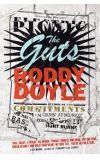
20 Aug 2013 04:24:09
Halfway through The Guts, Jimmy Rabbitte's father reminds him just how important this sporting event was for the Irish national psyche of the time: "We felt great about ourselves. For years after. An' tha' only changed a few years back. Now we're useless cunts again."
Jimmy sardonically responds by thanking his father for the political and historical analysis. To which Jimmy Sr replies: "Fuck off. You asked."
This humorous exchange between father and son is a typical example of Roddy Doyle's idiosyncratic style of prose, which capitalises on witty, minimalist and repetitive dialogue, to tell stories of working-class people from the north side of Dublin.
Using the vernacular and an economy of language has given the Booker-winning author enormous freedom to subtly explore themes of gender, identity and class-consciousness in much of his work hitherto.
When Doyle self-published his debut novel The Commitments in 1987, releasing it through a UK publisher a year later, it challenged previous ideas about what could be safely categorised as literary fiction.
If the Dublin writer ever gets privately nostalgic about some of his fictional creations, you can be sure that he has a soft spot for Jimmy Rabbitte.
When the world was first introduced to the young cocky manager of The Commitments in the late 1980s, he was in the process of trying to take Dublin soul to the masses. But as his dreams faded, and the years passed, life has changed considerably.
Jimmy is now 47 and married with four children. He jointly manages a website called kelticpunk.com.
He has also just found out that he has bowel cancer.
With death now looming as an everyday possibility, Doyle's central protagonist begins to act on impulses he might normally suppress.
He has an affair with Imelda Quirk, a former member of his erstwhile soul band. He also tracks down his estranged brother, Les, who lives in England, and whom Jimmy hasn't spoken to in more than 25 years.
Doyle conjures up a genuine tenderness, empathy and humanity when he writes about family life. We witness the emptiness Jimmy experiences after he tells his three boys of has cancer.
The writing here is sparse and direct, and has a distinctive stamp of Doyle-like simplicity: "They were awkward, polite, lovely. And separate – they stood like young men who didn't really know each other."
As Jimmy speaks with his father about his medical treatment, Doyle manages to capture a brilliant moment that hangs somewhere between comedy, tragedy, awkwardness and despair.
–The doctors an' tha'. The Specialists. The Team.
–The Team?
–Yep.
–What colour are their jerseys?
Jimmy couldn't think of an answer.
–It's terrible, said his da.
The skilful use of dialogue certainly works to Doyle's advantage here, but there are a number of weaknesses in this book, most of which stem from the plot.
Traditionally this is an area Doyle has always kept simple. And it has served him well in the past. In his Barrytown trilogy the plot for each respective book was concerned with a seminal moment that caused characters to think or act differently, and to see a future with infinite and positive possibilities: in The Commitments it was a soul band; in The Snapper it was a child coming into the world; while in The Van it was an enterprising business.
The problem with The Guts is that – while there is still this redemptive factor to Doyle's writing – there are too many plotlines developed: these then don't receive adequate attention as the story unfolds.
Thus the narrative fails to examine the outcome of Jimmy's affair with Imelda; the mystery of why Les went to England is never fully resolved, nor is his relationship with Jimmy properly explored.
Moreover, a scheme where Jimmy gets his eldest son, Marvin, to imitate a Bulgarian rock star – this is supposed to be part of the novel's climax – is unconvincing, and leaves the reader disappointed.
The release of this book coincides with the West End performance of The Commitments in the autumn.
Both will no doubt be a commercial success.
But there's still a question many readers will be thinking as they ingest yet another book by Ireland's most popular author: can Doyle produce something that credibly rivals the magic of his early novels? So far the answers appears to be no.

